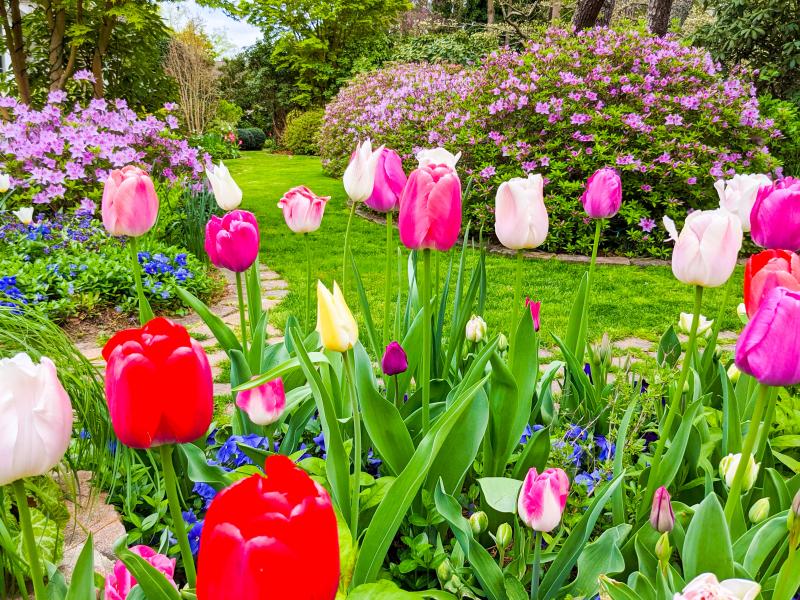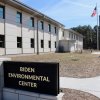To celebrate mid-spring beauty in full glory, Mill Pond Garden will open to welcome visitors from 10 to 11:30 a.m., Saturday, April 16, and Sunday, April 17, at 31401 Melloy Court, Lewes
Tickets, available at millpondgarden.com, are $15 to admit a vehicle with up to six visitors.
Mill Pond Garden is an IRS-certified nonprofit botanical garden on Red Mill Pond with a mission to provide holistic, beautiful, sustainable and educational plantings for the enjoyment and education of the community. A horticulturist will be on duty to answer questions.
This point in spring includes the greatest variety of flowering species for Cape Region gardens including early disease-proof azaleas, rhododendrons, hellebores, camellias, trilliums, woodland phlox, blue bells, Spireas, tulips, daffodils, Leucojum, iris, wisteria and flowering trees such as redbud, dogwood, sorrel tree, hawthorn and crabapple. Ground covers may also still be in bloom, including pachysandra, pulmonaria, herbs and periwinkle.
The garden has abundant birds, turtles, frogs and other wildlife as well as beautiful butterfly koi and shubunkin fish in a tea garden pond and gazebo.
The native and non-native sedges, genus Carex, will be flowering and/or seeding at this time. Sedges are under-used ground covers, great for adding color, texture and wildlife benefit to beds or lawns. Some sedges are for sun, some for shade, and they come in colors blue, pink, brown and every shade of green. They can range in height from a few inches up to a couple feet, with habits from straight-up leaves to arching, mounding shapes. Better nurseries offer a variety of sedges, grass-like clumping plants that can have wide leaves or very narrow ones. Semi-evergreen sedges can be used to replace a lawn, eliminating the need to mow except once a year in late February, though they are not as tough as lawn grasses, and not suitable for heavy foot traffic. Sedges can also do well in pots.
Mill Pond Garden is designed to be a four-season garden demonstrating how Cape Region gardens can thrive year-round, with woody plants labeled and professional horticultural advice available. Most of the plants are natives. The non-native plants are beneficial species that provide not only ornamental beauty but also work well for the wildlife which the garden encourages, such as pollinators and birds. The garden provides water, habitat, nesting, overwintering hibernaculums and food species for plants, insects and animals, all that is necessary as a National Wildlife Federation Certified Wildlife Habitat.
A holistic garden is one that includes and encourages wildlife and native plants as well as satisfying the desire for beauty. A holistic garden will have both still and moving fresh water, native shrubs, ground covers and key native trees like oak and black cherry, and willow trees that attract abundant caterpillars to feed baby birds in spring. All these in addition to broad, dense, mixed-species beds with both evergreen and deciduous plants provide habitat and food. It is gratifying to know that a holistic garden is the easiest to maintain and also the most satisfying and interesting to live in and with, the most like nature.
Isolating plants alone in a bed of mulch has been clearly demonstrated by research to not benefit the plants, nor the soil’s health or performance. A mix of plant types in a bed allows the maximum interplay of the microbial and fungal network underground that feeds and cares for all the plants.
Think of the beneficial soil fungi as the real gardeners or shepherds of the plants. The fungal mycelia form a network of white tubular threads that travel around all the roots of all the plants, branching out to all the other plants in the region as well, forming a connected community. Nutrients, both macro and micro, flow through these little tubes to where they are needed, and the fungus itself coordinates this nutrient exchange, monitoring the plants for chemical needs. The mycelia and fungi can also pass water to a thirsty plant from one that has more than enough. Since the fungal mycelia feed off some of the carbohydrates (sap) produced by the plants, they benefit themselves by taking care of the plants, helping them thrive and grow. The fungi are the gardeners, sharing food and water, breaking down wastes and recycling them.
Helping the beneficial fungi is smartest goal for a successful gardener. Organic fertilizers help increase the fungal establishment as well as the garden’s plants. One of the best organics is composted horse manure, which Mill Pond Garden produces for itself as well as for sale to the public. This compost, odor-free and safe, is not available for purchase in stores because it has to be freshly produced and has a short shelf life. Mill Pond Garden fills this gap in local supply, offering the only source unless gardeners compost their own. There may still be some left for sale on the open day.
Guests will have the chance to luxuriate their senses in the huge variety of colors, scents and shapes of the mid-spring garden, graced with the singing of birds and sounds of splashing fountains and waterfalls, and lovely vistas of Red Mill Pond.























































